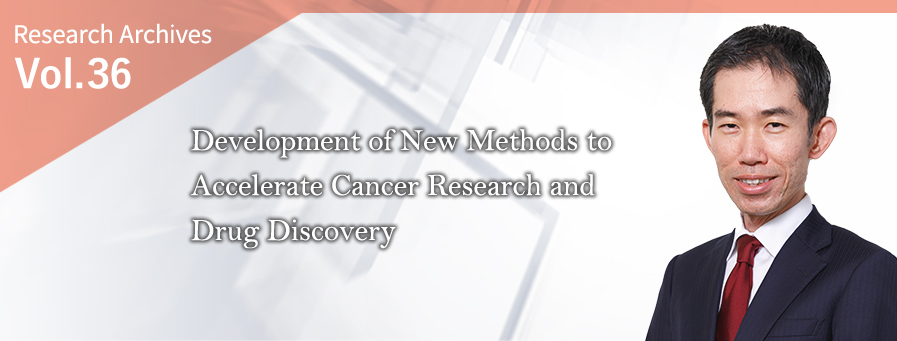
Department of Biomedical Oncology, Graduate School of Medicine, Hokkaido University
Masahiro Sonoshita Ph.D. Pathological
Oncology
- [Education]
-
- 1997 : The University of Tokyo (Tokyo, Japan)
B.A.; College of Arts and Sciences - 1997-1999 : The University of Tokyo
B.Pharm.; Faculty of Pharmaceutical Sciences - 1999-2001 : The University of Tokyo
M.Pharm., Genetics; Graduate School of Pharmaceutical Sciences; Advisor: Makoto M. Taketo
Dissertation: Enhanced intestinal polyposis by cytoplasmic phospholipase A2 (cPLA2) - 2001-2004 : Kyoto University (Kyoto, Japan)
Ph.D., Physiology (IHAKU2690); Graduate School of Medicine; Advisor: Makoto M. Taketo
Dissertation: Acceleration of intestinal polyposis by PGE2-EP2 signaling
Committee: Profs. Shoichiro Tsukita (Chair), Shigetada Nakanishi, and Tsutomu Chiba
- 1997 : The University of Tokyo (Tokyo, Japan)
- [Positions And Employment]
-
- 2001-2004 : Kyoto University
Research Fellow of Japanese Society for the Promotion of Science (JSPS) (DC1), Department of Pharmacology, Graduate School of Medicine - 2004-2008 : Kyoto University
Research Fellow of JSPS (PD), Department of Pharmacology, Graduate School of Medicine - 2008-2011 : Kyoto University
Assistant Professor, Department of Pharmacology, Graduate School of Medicine - 2011-2012 : Kyoto University
Senior Lecturer, Department of Pharmacology, Graduate School of Medicine - 2013-2017 : Kyoto University
Associate Professor, Department of Pharmacology, Graduate School of Medicine - 2013-2018 : Mount Sinai Medical School (NY, USA)
Visiting Researcher, Department of Developmental and Regenerative Sciences (Ross Cagan lab) - 2018- : Hokkaido University
Professor, Department of Biomedical Oncology, Graduate School of Medicine
- 2001-2004 : Kyoto University
Elucidating the pathogenic mechanisms and exploring novel drugs to make cancer a “controllable disease”
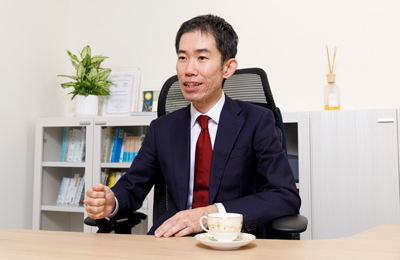
The Department of Biomedical Oncology established in 2018 is a department established by Professor Masahiro Sonoshita who had completed five years of study at Icahn School of Medicine at Mount Sinai in the United States. The word “control” in the department’s name in Japanese represents his desire to make cancer a “controllable disease” by understanding the mechanisms of cancers and establishing preventive and therapeutic measures.
“To control cancer, we must first answer the essential question, ‘What is cancer?’. Therefore, the main theme of this department is to elucidate the pathogenic mechanisms of how cancers develop. Then, we want to develop new therapeutics for cancer treatment. In addition to surgery, cancer treatment includes anti-cancer drugs and gene therapy, and our ultimate goals are understanding the pathogenic mechanism and the development of treatment methods,” Professor Sonoshita says.
In elucidating the mechanisms of cancer development, he discovered in 2001 that growth of benign tumors in the large intestine is promoted by epithelial-stromal interaction. In this process, one of the bioactive lipid prostaglandins PGE2 and its receptor EP2 function as the key signaling mediators. Based upon these findings, he proposed a novel strategy for preventing and treating intestinal tumors using antagonist drugs to EP2 receptor.
There are many laboratories working on cancer at Hokkaido University's Faculty of Medicine. The features of the department include that it utilizes multiple assay systems complementarily such as clinical specimens, cultured human cells, mice, and Drosophila (the fruit fly) to promote research efficiently. Above all, Professor believes that analyzing the functions of genes and drugs using Drosophila will be of great help in accelerating research.
“There are various restrictions in conventional mammalian models in drug discovery research. For example, mice can take months to nearly a year to see the effect of even a single drug. The truth is that we have to keep putting much labor and resource to such assays for many years before translation into clinics. While, Drosophila can make up for such shortcoming,” Professor says. “First of all, flies have highly conserved genes and signaling pathways with mammals. Furthermore, flies and mammals show very similar drug responses. Moreover, flies have a history of more than a century as an model organism to offer excellent experimental tools such as mutants. It takes only around 10 days to obtain their next generation, therefore it is easy to create models that mimic various genetic abnormalities. Leveraging these advantagens, we have been carrying out research quickly by using flies and mammals in a complementary manner.”
Accelerating drug discovery with flies
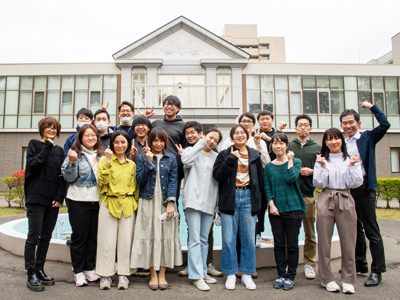
Professor Sonoshita has been engaged in drug discovery research using Drosophila since his stay in the United States. He studied under Professor Ross Cagan at Icahn School of Medicine at Mount Sinai (currently Regius Professor at the University of Glasgow) to establish a research pipeline that combines Drosophila and mammals. In developing drugs, one of the major challenges is toxicity of chemicals in patients. Employing this novel platform, Professor Sonoshita developed a rational method to transform an approved drug into a novel lead by reducing toxicity. Namely, he modified the chemical structure of a medullary thyroid cancer (MTC) drug sorafenib based on the mechanisms of toxicity that he revealed in chemical genetic experiments using flies. Resulting sorafenib analog significantly suppressed growth of human MTC cells, opening up a new path for a clinical trial in the future.
“Previous research including ours has revealed that gene functions and drug efficacy in flies can be reproduced well in mammals. We are now using flies to develop novel therapeutic candidates for treating pancreatic cancer, one of the most challenging cancer to treat. We have got several promising results already,” the professor says.
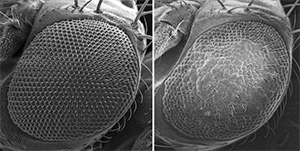
In the laboratory, they keep transgenic flies in 11 incubators set at different temperatures ranging 16-27℃ depending on experiments. They carry a yeast-derived system for controlling transgene expression, which enables us to generate fly models reproducing various genetic abnormalities in patients leading to diseases phenotypes (Figure 1). Through fly screening the lab can efficiently narrow down the number of genes and chemicals to verify in mammals, thereby shortening the time to clinical application.
“In terms of clinical application, we are focusing on orally available drugs which are easy to use. We can feed chemicals by infusing it into fly food. We are also interested in determining the effect of daily beverage and food, therefore we are testing their effects on phenotypes of our flies through feeding,” Professor says.
Professor Sonoshita also believes that it is important for specialists with various backgrounds together in cancer research.
“For example, pharmaceutical researchers in the lab can their new connections with patient care and specimens. Also, doctors can learn about how to generate better medicines for clinical use. These settings make the lab an attractive incubation space where lab members can complement each other and proceed with research,” Professor says. “Students from Graduate School of Dental Medicine are also enrolled in this department, where collaboration between medicine, dentistry and pharmacy is actively carried out. Students from School of Science and School of Engineering are also developing wonderful research. I do hope that we together generate various research methods and results basing upon our curiosity.”
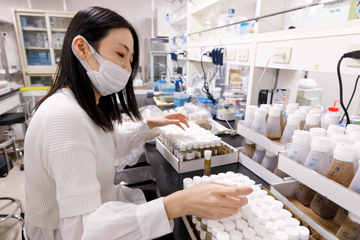
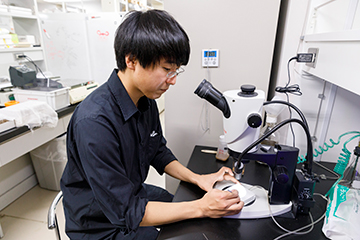
(Interviewed in October 2021)
Aiming academic goals in a friendly atmosphere
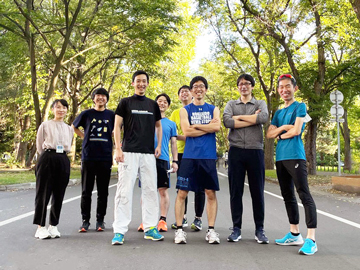
The Department of Biomedical Oncology is characterized by a friendly atmosphere, where faculty members and graduate students call each other by first names and hold birthday parties for each other, and it is a place where professionals from various fields, such as medicine, pharmacy, science, engineering, and dentistry, work together. In addition to research aimed at cancer control, there is a wide range of research projects such as the elucidation of the cancer mechanisms, the development of methodology for modeling genetic abnormalities, and the relationship between cancer and environments including beverages/foods and cancer. “I think that learning at graduate school is just a passing point in a researcher’s life. We support people who work hard to realize their dreams and goals, and of course we also support those who want to determine their goals through their research life. Please come and see us if you are interested,” Professor Sonoshita says.


